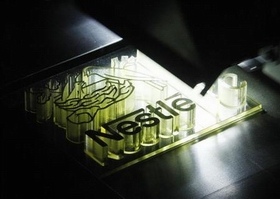 Mexico's Federal Competition Commission, which in November rejected the tie-up on the basis it would give Nestle too much power in the baby food market, said the Swiss company must also license the Pfizer brands for 10 years to whichever company buys the assets.
Mexico's Federal Competition Commission, which in November rejected the tie-up on the basis it would give Nestle too much power in the baby food market, said the Swiss company must also license the Pfizer brands for 10 years to whichever company buys the assets.Nestle will not be allowed to operate Pfizer's baby food brands for 20 years, although it can retain the license for Pfizer's Maternal products, which include multivitamins for women and which do not compete with any Nestle business, the Swiss company said a separate statement.
Nestle in January hired Rothschild to help the company sell Latin American assets valued at over $1 billion, as part of its drive to win regulatory approval for its purchase of the Pfizer unit, Bloomberg reported.
Mexico is Nestle's sixth biggest market, with $2.95 billion in sales in 2012, according to Nestle financial statements.
The size and value of Pfizer's baby food business in Mexico could not be determined.
Cofeco said that the deal would have given Nestle between 71 percent and 88 percent of the total volume of baby formula sales in Mexico.
Representatives of Nestle did not respond immediately to requests for clarification.
Without specifying a precise timeframe, Cofeco said the sale would be made soon, subject to its approval.
Nestle bought Pfizer's global baby food business in April last year, in a bid to harness the U.S. company's strong presence in emerging markets, where it makes 85 percent of its sales.
But Nestle has faced regulatory hurdles in getting the global deal approved at the local level. Analysts say that the Swiss conglomerate may have to sell up to 30 percent of the Pfizer units as part of the approval process.
The selloff could allow other baby food makers, such as Danone SA (DANO.PA), Mead Johnson Nutrition Co (MJN.N) and HJ Heinz Co (HNZ.N), to enter the Mexican market, analysts say.
Mexico is the world's fourth-largest baby milk market after China, the United States and Indonesia.







